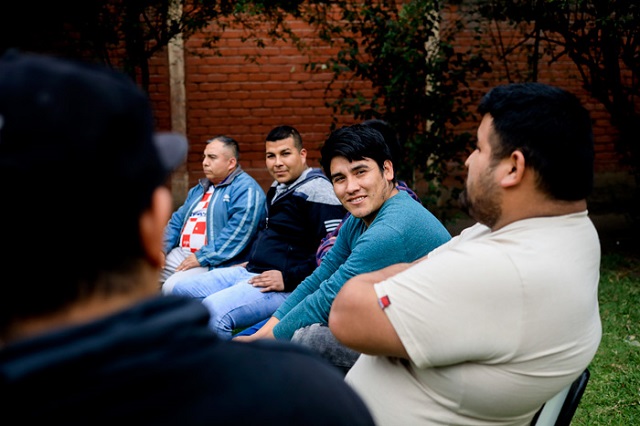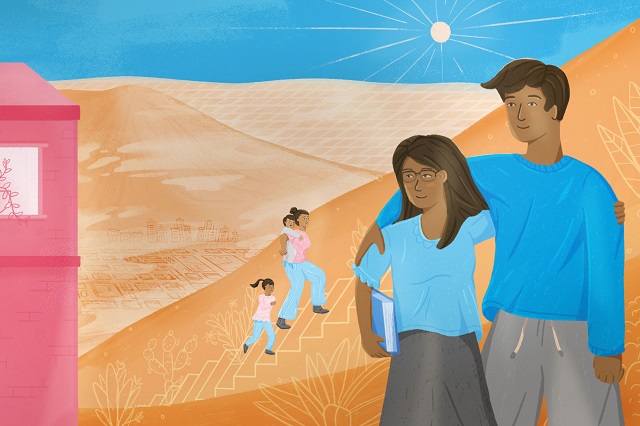Confronting Domestic Violence in Latin America

More than half of the children in Latin America experience domestic violence each year. In the world’s most violent region, emotional support is key to break the cycle of abuse.
Paul* (16), the oldest of four, lives in a house in his uncle’s backyard in Lima, Perú, with his mother, Marcela, and three siblings, Ana (13), Lucy (9) and Gabo (3). The house is smaller than their previous one, but Paul and his sisters feel safe here.
For years, the children witnessed their father constantly humiliate and mistreat their mother. In 2018, Marcela found out that her husband had sexually abused Ana, while she was away at work. Paul felt guilty. As the oldest brother, he felt he should have protected his sister.
SOS Children’s Villages Perú guided Marcela to file a police report and arranged a place for the family to live. But the traumatic experience left wounds too deep for the family to heal on their own.
“Paul tried to kill himself,” says Marcela, seated in her home surrounded by photos of her children. “He had depression and anxiety. Ana was afraid and the girls constantly got sick. The little one had language issues. I was fearful and I didn’t know how to help my children.”
More than 80% of children in Perú have been victims of violence in their homes and more than half of the cases reported in 2018 were related to physical or sexual violence from their parents, according to the National Survey of Social Relations of Perú.
Unfortunately, despite the alarming rates, the toll of the mental and emotional trauma brought on by domestic violence is often overlooked.
Children in families that face adversity are almost two times more at risk of a mental health diagnosis compared to children from average households, according to mental health experts. To have self-reliant and independent adults – and break the cycle of violence – we need to address the trauma they have experienced.
Across Latin America, SOS Children’s Villages supports the mental health of children in various ways. Some of the innovative and creative ways SOS provides psychosocial support is through our SOS Social Circus classes and workshops that teach positive masculinity to fathers.
“Each national association has different approaches, based on local realities and needs,” says Maricruz Granados, the SOS program development coordinator for Latin America. “But the overall objective is to prevent domestic violence, building awareness and resilience, aiming to break the cycle of abuse, suffering and abandonment in the region.”

The unseen traces in children
Stephany Orihuela, a child’s safeguarding specialist at SOS Children Villages, says the low self-esteem and low self-worth of children who have experienced violence is what stands out. But therapists must also work on the underlying issues as well. “This is the need of affection, of belonging, to be heard and loved,” says Ms Orihuela. “This is what a therapist must connect with. Without emotional well-being, it is impossible to improve their behaviour,” she adds.
A toxic environment at home distorts a child’s view of relationships in various ways. First, they learn that if somebody loves them, they can be violent. Secondly, they internalize that anyone with certain authority can humiliate them and mistreat them. And lastly, for a lack of communication abilities, violence becomes a way to solve conflicts. Evidence shows that children living in homes with domestic violence are at increased risk of becoming aggressors or victims in the future. The priority in psychological therapy is to deconstruct these beliefs, otherwise, they will carry them throughout their lives and in all their relationships.
Building resilience and self-confidence
In the Peruvian system, once a domestic violence report is filed in a Women’s Emergency Centre, psychological therapy is usually mandatory for parents to keep their children. Unfortunately, the services offered by the state are often insufficient as there is a high demand and a loss in quality. A child abuse victim receives only three to five sessions with a counsellor in a public health institution before the case is closed.
SOS Children’s Villages Perú works in partnership with the state to offer support to avoid family separation. Besides legal guidance and capacity building in parental skills and economic independence, they work in partnership with private institutions to offer psychological therapy to families who have suffered domestic violence.

Marcela and her children all undertook weekly individual psychological therapy for six months, while also receiving home visits from an SOS family advisor, Ms. Ñuñez, who offered support and advice. The children also attended the Older Brother Initiative at the SOS Social Centre, where they received tutoring after school along with art or music lessons.
“All of these helped the children develop self-confidence and resilience,” says Ms. Ñuñez. “Also, through the workshops organized at the SOS Social Centre for the families in the communities, we improved their bonds and communication with their mother.”
Paul eventually overcame his depression. He will finish school this year and wants to become a doctor to protect and heal others. Lucy is healthy and full of energy and little Gabo quickly improved his language abilities with support at the SOS Social Centre.
Today, Ana shows her new home proudly. She is happy they have a home of their own and feel safe. In the future, she wishes to become a nurse like her mother. “My mother is my example of courage and love, I want to become a nurse like her,” she says.
*Names and images changed to protect the privacy of children and adults. In-person program activities in the region have been suspended due to the COVID-19 pandemic. SOS staff are in constant contact with the families via telephone and other methods to safely provide guidance and support.
Canadians wishing to help vulnerable children are encouraged to sponsor a child, sponsor a Village or make a Donation today to our COVID-19 response.
